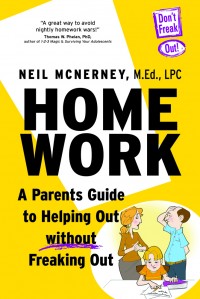Rewards vs. Punishments – When to Use Which?
 What is the hardest thing to consistently do well? Most of us who have had children will quickly answer with: “Being a good parent.” Parenting falls into the Toughest Job You’ll Ever Love category. But let’s be honest. Most of us don’t really love parenting. Of course, we love our kids. In fact, we had no idea we could love something so much until we became a parent. But being a great parent? That is hard work.
What is the hardest thing to consistently do well? Most of us who have had children will quickly answer with: “Being a good parent.” Parenting falls into the Toughest Job You’ll Ever Love category. But let’s be honest. Most of us don’t really love parenting. Of course, we love our kids. In fact, we had no idea we could love something so much until we became a parent. But being a great parent? That is hard work.
As a counselor and author, I understand the reasons parenting can be so hard. As a father of two, I also understand, the ups and downs of being a good parent.
With that in mind, I would like to share with you one of my favorite discipline short-cuts:
Rewards and Punishments – How to Choose?
There are only a few ways that we can be the best leader for our kids. One of them is learning an approach to rewarding and punishing. I will give you some ideas on how to decide whether to use rewards or punishments in a way that won’t come across as mean or bossy.
I know there are opinions on both sides of the reward/punishment issue. Many people think we should not reward or punish our kids. Others think that it is an essential tool for parents to help guide children. My opinion: I think rewarding and punishing has its place in parenting, but we shouldn’t rush to it too quickly. In upcoming columns, I will share additional ideas you can use that might decrease the need to use rewards and punishments in your home.
The first thing to keep in mind is that rewards work very differently than punishments. In general, rewards are motivating: they increase the desire to do something. Punishments, on the other hand, are demotivating: they decrease the desire to do something. If you can keep this in mind, you are halfway there.
Step One – Start vs. Stop Behaviors
The first step in the process is to figure out whether you are dealing with a start or a stop behavior. Ask yourself: Do I want my child to stop doing something, or start doing something? If I want him to stop teasing his sister, this would be a stop behavior. If I want him to start his homework, it’s a start behavior. A start behavior is usually something positive that we want our kids to do: chores, homework, dinner, shower, etc. A stop behavior is usually something negative that we want our kids to stop doing: hitting, teasing, being annoying, being disrespectful, etc.
So now that you have been able to figure out whether you are dealing with a stop or start behavior, you have the key to being able to decide whether to punish or reward.
Step Two – Reward or Punish
It is better to punish a stop behavior and reward a start behavior. For instance, it is better to punish a child for hitting his sister than it is to reward him for not hitting her. Remember – punishments tend to be demotivating; since we want to demotivate hitting, a punishment will work best. For example: “Since you hit your sister, you will not be able to get on the computer tonight.”
Therefore, it is better to reward a child for doing homework than to punish him for not doing it. So which type of behavior is homework? A start behavior. We want our child to start doing homework, so a reward will work best. For example: “After you have completed your homework, you can then spend some time playing.”
The reason why this concept works so well is that it mimics real life. In general, we are punished for stop behaviors and rewarded for start behaviors. If I am caught speeding (a stop behavior), I will be punished with a ticket and a fine. If I do well at my job (a start behavior), I am rewarded with a paycheck and possibly a bonus.
So when you are thinking about how to deal with a situation that needs a reward or punishment, try using these simple ideas: Stop behaviors = punishments and start behaviors = rewards.
Are you interested in reading about a certain parenting topic, or do you have a parenting question? Contact Neil at: neil@neilmcnerney.com.
Neil McNerney is a licensed counselor in private practice in Purcellville and author of Homework – A Parent’s Guide To Helping Out Without Freaking Out! Neil provides seminars to parents both locally and nationally on topics of parent leadership.